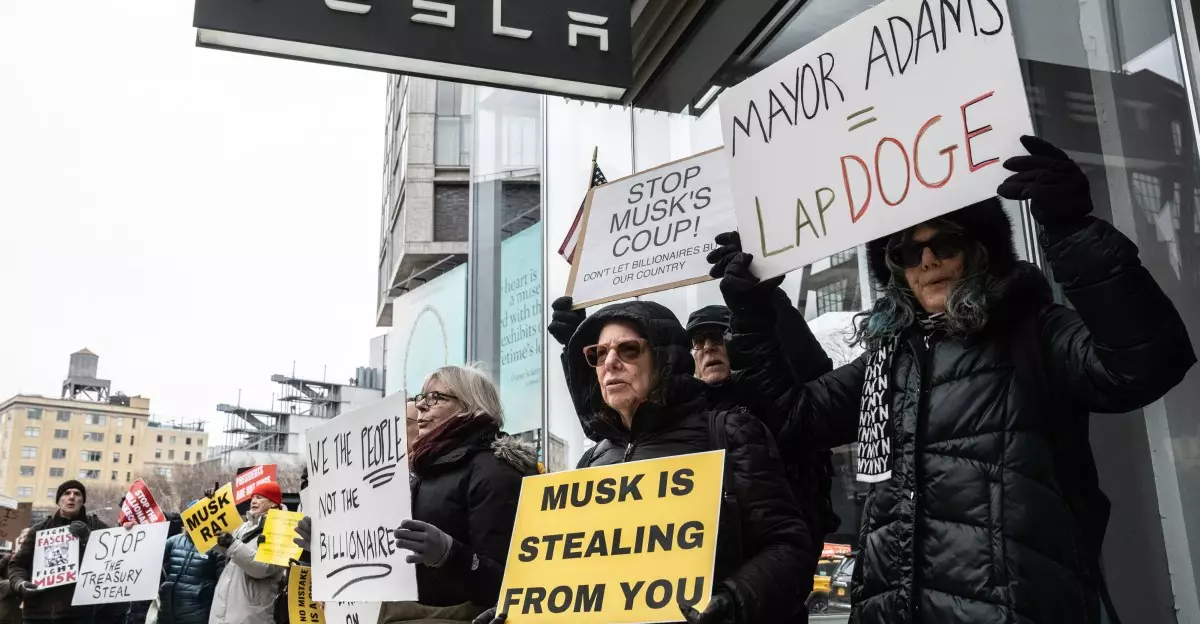Recent weekends have seen a notable uptick in protests outside Tesla showrooms across the United States, ignited by the trending hashtag #TeslaTakeover on social media platforms like Bluesky. While the size of these gatherings may not match the scale of larger movements, their widespread occurrence—from bustling urban centers such as New York City to smaller communities like Golden Valley, Minnesota—signals a palpable discontent among segments of the public towards Tesla and its CEO, Elon Musk. This level of grassroots mobilization hints at a collective sentiment that extends beyond mere dissatisfaction with products; it’s a referendum on the corporate ideals and political affiliations represented by Tesla’s leadership.
Elon Musk, a polarizing figure in the tech industry, has become a focal point in these protests primarily because of his controversial leadership decisions and political affiliations. Critics have pointed to his role as the head of the Department of Government Efficiency during Donald Trump’s presidency, arguing that his management style and public persona are detrimental to the ethos of innovation and environmental responsibility that Tesla is supposed to represent. This perceived conflict has fueled claims that Musk’s actions hurt Tesla’s reputation and financial stability, leading to a 21 percent drop in the company’s stock price since Trump took office, as noted in recent financial analyses.
The discontent is not limited to external observers; even some Tesla employees are reportedly voicing frustrations. Internal discussions have revealed that key staff members believe the company would be better off if Musk stepped down, accentuating the depth of concern regarding his leadership. This internal dissent adds another layer of complexity to the ongoing protests, revealing that the issues at play are deeply ingrained within the company itself.
At the heart of the demonstrations are a series of symbolic chants and signs aimed at drawing attention to Musk’s controversial stances. At a sizable protest in Manhattan, participants could be heard chanting slogans such as “Don’t buy swasticars” and “Elon Musk can go to Mars; we don’t need your Nazi cars.” Such messages serve to align broader socio-political sentiments against far-right ideologies with personal boycotts of Tesla products. The references found within the chants—aimed directly at Musk’s support for extremist groups—underscore a fear that Tesla represents more than just electric cars; it embodies a political stance that many find objectionable.
Protests were also significantly visible along the West Coast, where citizen activists gathered in cities like Berkeley and San Francisco—places often associated with progressive movements. This geographical diversity in protest locations adds weight to the notion that Tesla’s sphere of influence is under scrutiny from coast to coast.
Lending further visibility to the movement, celebrities like actor and activist Alex Winter have prominently supported the protests. Winter’s calls to action, such as urging consumers to sell their Teslas, have generated significant social media traction, amplifying the calls for accountability from those at the top of Tesla’s corporate ladder. The endorsement of public figures could very well drive further participation, potentially impacting Tesla’s market performance as consumers reassess their loyalties based on Musk’s political assertions.
In stark contrast to the magnitude of #TeslaTakeover posts on Bluesky, there is noticeably less engagement on more mainstream platforms like X, Instagram, or Threads. This disparity reveals the complex landscape of social media, where activist messaging sometimes finds a home on alternative platforms while mainstream audiences remain more disengaged.
Looking Ahead: The Future of Protests Against Tesla
Protests are not expected to cease anytime soon, particularly as various demonstrations are planned to coincide with the President’s Day holiday. The actions taken over this weekend hint at a long-term strategy among organizers to maintain visibility against Musk’s influence, while also challenging the consumer relationship with Tesla products. With rallies targeting other aspects of Musk’s public persona and influence on politics, it appears that the #TeslaTakeover movement is part of a larger narrative regarding corporate accountability, consumer rights, and ethical leadership.
The growing unrest surrounding Tesla signals a multifaceted critique that encompasses both corporate practices and broader political implications. As protesters continue to gather outside showrooms and raise their voices against Musk’s controversial actions, the world watches closely, uncertain of the long-term impact these movements may have on the future of one of the most recognized brands in electric vehicles.


Leave a Reply